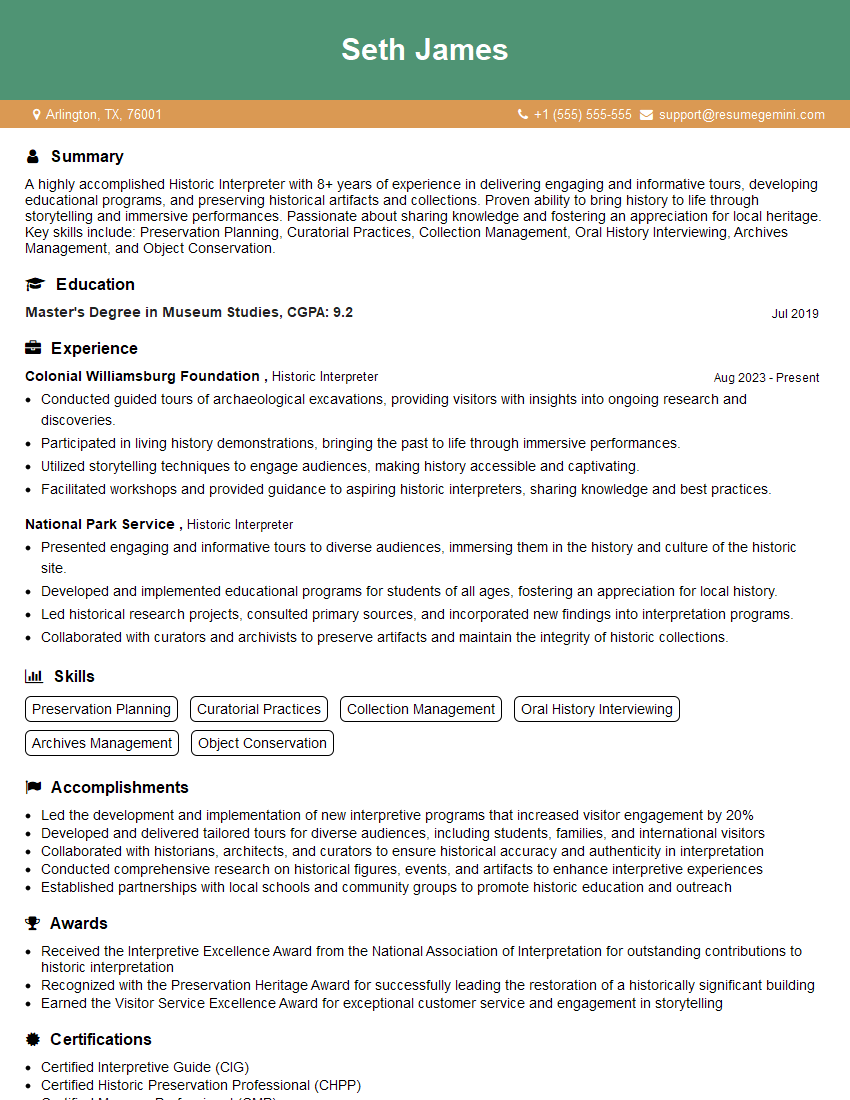Are you a seasoned Historic Interpreter seeking a new career path? Discover our professionally built Historic Interpreter Resume Template. This time-saving tool provides a solid foundation for your job search. Simply click “Edit Resume” to customize it with your unique experiences and achievements. Customize fonts and colors to match your personal style and increase your chances of landing your dream job. Explore more Resume Templates for additional options.

Seth James
Historic Interpreter
Summary
A highly accomplished Historic Interpreter with 8+ years of experience in delivering engaging and informative tours, developing educational programs, and preserving historical artifacts and collections. Proven ability to bring history to life through storytelling and immersive performances. Passionate about sharing knowledge and fostering an appreciation for local heritage.
Key skills include: Preservation Planning, Curatorial Practices, Collection Management, Oral History Interviewing, Archives Management, and Object Conservation.
Education
Master’s Degree in Museum Studies
July 2019
Skills
- Preservation Planning
- Curatorial Practices
- Collection Management
- Oral History Interviewing
- Archives Management
- Object Conservation
Work Experience
Historic Interpreter
- Conducted guided tours of archaeological excavations, providing visitors with insights into ongoing research and discoveries.
- Participated in living history demonstrations, bringing the past to life through immersive performances.
- Utilized storytelling techniques to engage audiences, making history accessible and captivating.
- Facilitated workshops and provided guidance to aspiring historic interpreters, sharing knowledge and best practices.
Historic Interpreter
- Presented engaging and informative tours to diverse audiences, immersing them in the history and culture of the historic site.
- Developed and implemented educational programs for students of all ages, fostering an appreciation for local history.
- Led historical research projects, consulted primary sources, and incorporated new findings into interpretation programs.
- Collaborated with curators and archivists to preserve artifacts and maintain the integrity of historic collections.
Accomplishments
- Led the development and implementation of new interpretive programs that increased visitor engagement by 20%
- Developed and delivered tailored tours for diverse audiences, including students, families, and international visitors
- Collaborated with historians, architects, and curators to ensure historical accuracy and authenticity in interpretation
- Conducted comprehensive research on historical figures, events, and artifacts to enhance interpretive experiences
- Established partnerships with local schools and community groups to promote historic education and outreach
Awards
- Received the Interpretive Excellence Award from the National Association of Interpretation for outstanding contributions to historic interpretation
- Recognized with the Preservation Heritage Award for successfully leading the restoration of a historically significant building
- Earned the Visitor Service Excellence Award for exceptional customer service and engagement in storytelling
Certificates
- Certified Interpretive Guide (CIG)
- Certified Historic Preservation Professional (CHPP)
- Certified Museum Professional (CMP)
- Certified Archives Manager (CAM)
Career Expert Tips:
- Select the ideal resume template to showcase your professional experience effectively.
- Master the art of resume writing to highlight your unique qualifications and achievements.
- Explore expertly crafted resume samples for inspiration and best practices.
- Build your best resume for free this new year with ResumeGemini. Enjoy exclusive discounts on ATS optimized resume templates.
How To Write Resume For Historic Interpreter
- Highlight your passion for history and your ability to engage audiences with your storytelling skills.
- Quantify your accomplishments whenever possible, using specific numbers and metrics to demonstrate your impact.
- Showcase your knowledge of preservation practices and your commitment to maintaining the integrity of historical artifacts and collections.
- Demonstrate your ability to work independently and as part of a team, collaborating effectively with curators, archivists, and other professionals.
Essential Experience Highlights for a Strong Historic Interpreter Resume
- Present engaging tours to audiences of all ages, immersing them in the history and culture of historic sites.
- Develop and implement educational programs for students, fostering an appreciation for local history.
- Conduct guided tours of archaeological excavations, providing visitors with insights into ongoing research and discoveries.
- Collaborate with curators and archivists to preserve artifacts and maintain the integrity of historic collections.
- Participate in living history demonstrations, bringing the past to life through immersive performances.
- Facilitate workshops and provide guidance to aspiring historic interpreters, sharing knowledge and best practices.
Frequently Asked Questions (FAQ’s) For Historic Interpreter
What are the essential skills for a Historic Interpreter?
Essential skills for a Historic Interpreter include strong communication and storytelling abilities, a deep knowledge of history and culture, and experience in public speaking and audience engagement.
What are the different types of Historic Interpreter roles?
There are various types of Historic Interpreter roles, including museum interpreters, historical reenactors, tour guides, and living history performers. Each role may have specific requirements and responsibilities.
What is the job outlook for Historic Interpreters?
The job outlook for Historic Interpreters is expected to grow in the coming years, as there is an increasing demand for professionals who can engage audiences with historical content and promote cultural heritage.
What are the educational requirements for becoming a Historic Interpreter?
While specific educational requirements may vary depending on the role and organization, many Historic Interpreters hold a bachelor’s or master’s degree in history, museum studies, or a related field.
What are the career advancement opportunities for Historic Interpreters?
Career advancement opportunities for Historic Interpreters include promotions to lead interpreter, curator, or director positions, as well as opportunities to specialize in specific areas of historical interpretation or research.
How can I prepare for a career as a Historic Interpreter?
To prepare for a career as a Historic Interpreter, you can volunteer at historical sites or museums, participate in living history programs, and develop your research, writing, and public speaking skills.
What are the challenges faced by Historic Interpreters?
Historic Interpreters may face challenges such as balancing historical accuracy with audience engagement, dealing with sensitive or controversial topics, and working in outdoor or challenging environments.